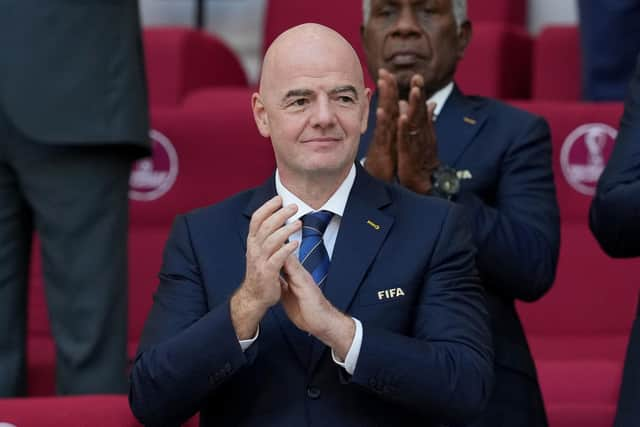Qatar World Cup: Who will look back fondly on grim sportswashing of this tournament? – Martyn McLaughlin
This happy confluence of events made the romance of it all impossible to resist, even after that Costa Rica goal put paid to Scotland’s hopes. From that point on, I, like many Scottish supporters, resolved to cheer on Cameroon, the unfancied side who shocked Argentina in the group stages and came within a whisker of ousting England in the quarter finals.
Their compelling story, and others, live long on the memory, and forged lasting associations in my mind. To this day, I cannot watch footage of Roger Milla’s gyrating hips without catching the scent of Madeira wine in the air.
Advertisement
Hide AdAdvertisement
Hide AdIt was a World Cup cherished by many, and over the intervening three decades, it has assumed almost mythic status in the collective memory of football fans. It is, in many ways, an ironic standing, given Italia ’90 produced the lowest goals per game ratio of any World Cup and boasted more than its fair share of drab, defensive encounters.
Yet its timing was significant, particularly on these shores. It is credited as the moment that England fans rediscovered their love for the game after the slim pickings of the 1980s, when hooliganism severely curbed the game’s appeal, and the atrocities of Hillsborough, Bradford, and Heysel took a heavy toll. Gazza’s tears, so goes the well-worn narrative, helped pave the way for the Premier League, and set in motion the slow but inexorable transformation of football from a sport into a global commodity.
For those who questioned where that trajectory might lead, the Qatar World Cup has provided an answer. The first round of group matches has yet to be completed, yet already, the predictions that it would amount to little more than a tainted and unedifying spectacle of sportwashing have proved bang on the money.
Where once the World Cup was an unmissable appointment, the indifference to its latest edition in the Gulf state should come as no surprise. From a sporting point of view, its timing in the middle of the domestic season has significantly curbed teams’ preparations, and the atmosphere at the games has often been dour.
The apathy of ordinary Qataris towards the sport was writ large during their opening tie against Ecuador when, with their side two goals down at half time, thousands decided to leave Al Bayt Stadium in Al Khor. They waited 12 years to host a World Cup, and in the end, they could not even see out 90 minutes.


But such failings are nothing compared to the myriad human rights abuses in the host nation. It is a country where migrants and domestic workers routinely face forced labour, exploitation, and the theft of their wages, where same-sex consensual sexual acts remain outlawed, and where punitive legislation is wielded to clamp down on press freedom and freedom of expression. That is to say nothing of its reprehensible stance on women’s rights, and a deeply flawed justice system.
Time and again, Fifa has failed to condemn such abuses, or exert sufficient pressure on Qatar to bring about meaningful change. Instead, it alternates between silence and glib appeals for the watching world to focus on the football. The latest shameful episode occurred just hours before England’s opening fixture against Iran, when word arrived that any player wearing OneLove rainbow armbands would face sporting sanctions.
The English FA, along with their Welsh counterparts, were among seven national football federations who contacted Fifa last September announcing their intention to wear the armband, intended as a protest at all forms of discrimination. As is Fifa’s modus operandi, it shut down all dialogue, only announcing its position at the last possible moment.
Advertisement
Hide AdAdvertisement
Hide AdIt seems inconceivable that no pressure was brought to bear on football’s international governing body by Qatar. Either way, its fearfulness over what is a relatively small gesture demonstrates that for all the platitudes aired during the cringeworthy opening ceremony, this is a World Cup that has shown the red card to tolerance.
Regardless of the changes at the upper echelons of Fifa in recent years, it is clear that the organisation remains an international embarrassment. On the eve of the World Cup, Gianni Infantino, the man who replaced the disgraced Sepp Blatter as president, gave a rambling and widely derided speech.
Naturally, a great deal of newsprint has been devoted to some of his wilder comments (“Today I feel gay. Today I feel disabled. Today I feel [like] a migrant worker”), but what offended me the most was the way in which he breezily dismissed human rights criticisms, insisting for example that Qatar was offering an “opportunity” to migrant workers.
Perhaps this is the natural consequence of a governing body that has now awarded three consecutive World Cups to countries where there have been repeated examples of human rights violations in the lead up to the tournament. It seems blinded by money, and incapable of seeing wrongs.
At those previous tourneys in Brazil and Russia, there was a growing disquiet among fans that a cherished competition was being weaponised for propaganda. In the end, it did not significantly quell the public appetite for the football itself, and that may prove to be the case in Qatar.
But now that it has kicked off, it feels like this World Cup has crossed a line, with supporters powerless to bring about change. Infantino will serve another four years at the helm of Fifa having stood unopposed for a third term. His conduct in Qatar offers no confidence that he is the man to bring about change.
It all seems a world away from Italia ’90. To this day, that tournament is warmly remembered by many through rose-tinted spectacles. How many people will say the same about Qatar in 30 years’ time?
Comments
Want to join the conversation? Please or to comment on this article.